Archive
EG Radio May 9: the Kalamazoo River oil spill 3 years later

Photograph: State of Michigan
This week on Earthgauge, we take a look back at what happened in Michigan in 2010 when an Enbridge pipeline ruptured spilling roughly 1 million gallons of oil into the Kalamazoo River. What is the legacy of the spill and is there anything for the rest of us to learn as we debate the construction of more pipelines from the tar sands of Alberta to B.C. and the Gulf of Mexico?
I have 3 interviews on the program today:
- Susan Connelly, a local resident of Marshall, MI where the spill occurred
- Jeff Insko, founder of the Line 6B citizen’s blog, a web site for residents who have pipelines running directly beneath their property
- Josh Mogerman, spokesperson for the Natural Resources Defence Council
We’ll also have our usual update from Kathy of Ecology Ottawa on local environmental events and campaigns.
Click the audio player above to stream the show or right click here to download.
Thanks to a fellowship from the Institute for Journalism and Natural Resources, I had the opportunity to travel to Kalamazoo and the surrounding area last week to learn about the Kalamazoo River and, in particular, the Enbridge oil spill of 2010.
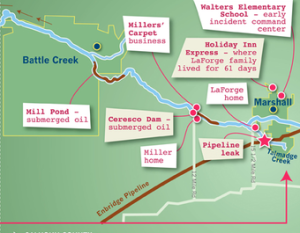
On Sunday, July 25, 2010, Enbridge Line 6B ruptured near Marshall, Mich. and released more than one million gallons of tar sands diluted bitumen into Talmadge Creek and the Kalamazoo River. Illustration by Catherine Mann for InsideClimate News.
Remember that one? It happened on July 25 just a couple weeks after BP finally sealed their leak in the Gulf of Mexico following the explosion of the Deep Water horizon oil rig that killed 11 workers.
Six inches of rain fell in the days after the Enbridge pipeline spill, raising Talmadge Creek and the Kalamazoo River into “a roiling brown torrent that overflowed its banks by several feet,” according to the seven-month, Pulitzer prize-winning investigation conducted by InsideClimate News. Talmadge Creek, which is usually five to six feet wide and a foot deep, stretched 100-feet wide after the downpour.
The spill occurred in Marshall, a community of 7,400 in southwestern Michigan. It drove 150 families permanently from their homes, yet the media spotlight never settled on their story — perhaps in part because this spill occurred 10 days after BP Plc’s Macondo well was finally capped after three months of spewing oil into the Gulf of Mexico.
Enbridge Energy Partners, a U.S. affiliate of Enbridge Inc., operated the pipeline. The company has spent more than $765 million cleaning up the spill.
Oiled sections of the Kalamazoo River reopened to the public in June 2012 — 23 months after the spill.

Photograph: State of Michigan
On today’s special show, we hear a couple different perspectives from residents who have been affected by the spill and its aftermath. First up is Susan Connelly, a local resident who was living near the oil spill when it occurred. Her kids daycare was just a half mile away so she tells us about some of the health effects her family and her community suffered immediately following the spill and in the intervening 3 years.
Susan Connelly (right click here to download):
Next we hear from another local resident Jeff Insko who started the Line 6B citizen’s blog. After the rupture of the pipeline known as line 6B, Enbridge decided to replace a huge section of pipe through Michigan, some of which runs through the property of local residents. Jeff will tell us why he has been less than satisfied in his dealings with Enbridge as they exercised their legal authority to do dig up his property and cut down all his trees in order to install new pipe. Will his experience be echoed by many other property owners as new pipelines are constructed in the coming years across North America?
Jeff Insko (right click here to download):
Finally, we hear from Josh Mogerman of the Natural Resources Defense Council on why he feels tar sands oil is much more difficult and problematic to transport through pipelines than conventional crude and how this may have played a role in the Kalamazoo spill.
Josh Mogerman (right click here to download):
First though, to get some context on what actually happened in the summer of 2010, we hear a piece from The Rachel Maddow Show on MSNBC, which was broadcast in July 2012 following the release of the US National Transportation Safety Board’s scathing report about Enbridge’s handling of the spill and their mistakes leading up to it.
Why does a pipeline rupture in Michigan matter? Well, because many plans are afoot for new pipelines from the tar sands of Alberta, including proposals through the US in the form of the Keystone XL pipeline and to the west coast of B.C. with the Northern Gateway pipeline. So today we’re going to find out about the experiences of local residents looking back 3 years later at the Kalamazoo River spill in 2010. Let’s hope we’ve learned our lessons and don’t repeat the mistakes of Kalamazoo as we debate the merits of constructing new pipelines across North America to extract even more tar sands oil at ever increasing rates.
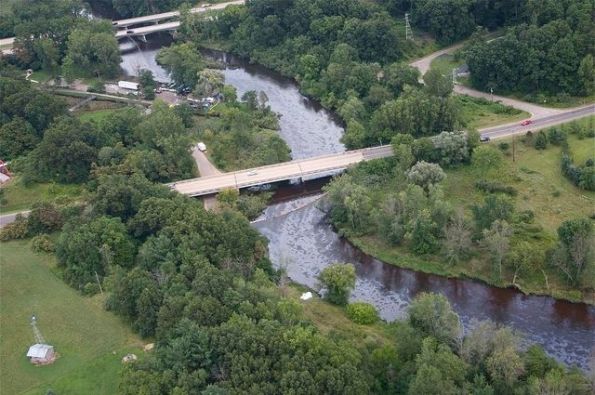
Photograph: State of Michigan
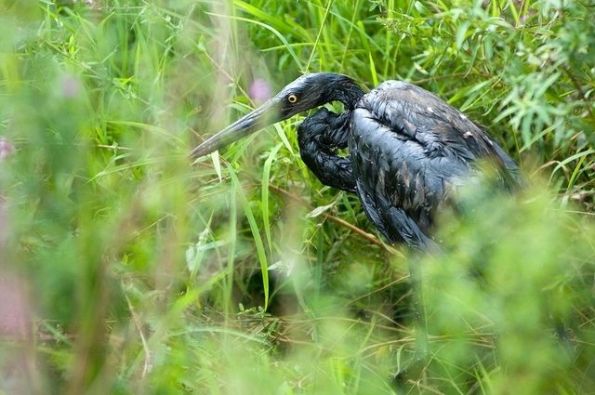
Photograph: State of Michigan
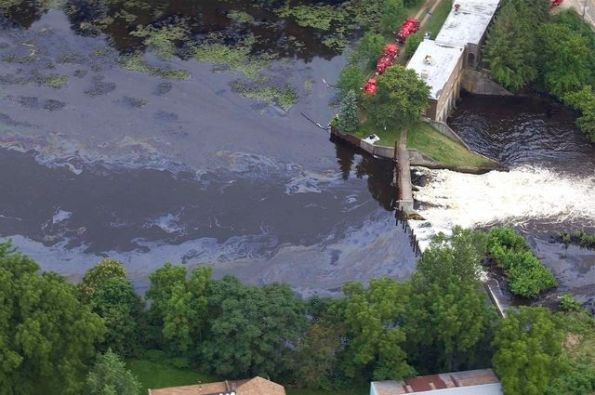
Photograph: State of Michigan
EG Radio March 7 2013: Reconnecting with the natural world around us
Ever wondered where your water comes from and where your wastewater goes? How much garbage do we produce in Ottawa and where does it go? What did the city look like a couple hundred years ago? Where does the gas come from that fills up our tanks? How much of our food is produced locally?
On this week’s edition of Earthgauge, we’ll discuss all this and more with Janice Ashworth. She helped put together a handy little booklet called ‘The Ecology of Ottawa‘ and she’ll be joining me for a feature 2-part interview.
Also on the show, hear my interview with Ali Howard and Andrew Eddy about their film ‘Awakening the Skeena‘. The summer of 2009 saw Ali Howard become the first person on the planet to ever swim the entire 610km Skeena River. After 26 days of whitewater, boulder gardens, crazy currents and community celebrations, she did it! Why? Well, it turns out that the Skeena is threatened by various forms of industrial development and she wanted to bring awareness to the the threats to one of Canada’s great salmon rivers.
We also have our weekly update from Graham of Ecology Ottawa on local environmental events and campaigns in the Ottawa area.
Click the audio player above to stream the show or right click here to download.
Part 1 – Awakening the Skeena with Ali Howard and Andrew Eddy
Interview with Ali Howard and Andrew Eddy (right click here to download):
Canadian ethnobotanist Wade Davis has called the headwater region of the Skeena River in northwestern B.C. “the Serengeti of Canada” because of its abundance of wildlife. He says it is “a landscape that is as beautiful as anything I’ve ever seen, in my experience as an explorer in residence for the Geographic, going to as many as 30 countries a year.” This valley in a rugged corner of the province is the birthplace of three of Canada’s most important salmon rivers: the Stikine, the Skeena and the Nass. Known as the sacred headwaters to First Nations living in the region, it has tremendous economic, cultural and spiritual importance. The rivers support a $100-million wild salmon economy that sustains communities along the Skeena and includes First Nations fisheries, commercial fishing, and recreational angling.
Three proposals for mining in the region have drawn fierce opposition from local residents, particularly Shell Oil’s plans to mine for coal bed methane near the headwaters. Ali Howard was one of those concerned residents when in 2009 she decided to do something to to raise awareness about the importance of the Skeena and the threats to it. What did she do? Protest and organize? No sir. She decided to swim the entire length of the 610km river in 26 days.
I know we often have our fair share of grim environmental news on Earthgauge but I am pleased to tell you that this story has a happy ending! Thanks to Ali’s efforts and those of many others such as the Skeena Watershed Conservation Coalition, in December 2012 coalbed methane development was permanently banned from the headwaters and Shell withdrew its plans to develop. Further evidence that with hard work and determination positive change can and does take place. A film was made about Ali’s heroic swim called Awakening the Skeena and she came to Ottawa last week for a screening. So I caught up with her and the film’s director Andrew Eddy.
Part 2 – The Ecology of Ottawa
Part 1 of Janice Ashworth interview (right click here to download):
Part 2 of Janice Ashworth interview (right click here to download):
Now as you well know, we have an impact on and we are impacted by our local, natural environment and that’s why on today’s show we’re talking about regaining the connection between ourselves and the places in which we live whether it be in the remote, far-flung reaches of northern BC or right here in the Ottawa valley. It’s easy for us to lose sight of the natural world around us and how we impact it, and we sometimes lose the connection between ourselves and the Earth and water that keep us alive. Many of us don’t know where our wastewater goes once it’s flushed down the drain or where our electricity and heat come from. What about the gas that fills up our tanks? How much garbage do we produce and where does it go? How much of our food is locally produced?
I myself didn’t know the answer to many of these important questions and I thought it was about time I found out. It turns out our friends at Ecology Ottawa have produced a handy little booklet called The Ecology of Ottawa that answers all of these questions and many more. I caught up with Janice Ashworth, one of the people who helped produce the book, to discuss some issues that all of us living in Ottawa should really know. I am pleased to present a feature 2-part interview with Janice on today’s program.
Our show today is all about regaining the connection between ourselves and the places in which we live. Of course, the best way to connect with the local bioregion that we call home is to get out there and explore it for ourselves. We are truly blessed here in Ottawa to have such spectacular recreational opportunities at our door step year round. As the intro to ‘The Ecology of Ottawa’ booklet says,
it’s easy for us to lose sight of the natural world. We lose the connection between ourselves and the Earth and water that keep us alive. We flick on a light switch without thinking about where the energy comes from or what it does to the earth. We flush the toilet without knowing where the wastewater goes and our garbage is whisked off to some distant place called “away.” But we are deeply connected to the water, land, and air. It affects us and we affect it, every single day through the water, energy and other resources that flow through our homes.
Earthgauge Radio airs every Thursday morning at 7:00 AM on CKCU 93.1 FM in Ottawa and online around the world at www.ckcufm.com. Ottawa’s only radio program dedicated exclusively to environmental news and commentary from Ottawa, across the country and around the world. Podcasts on iTunes and right here on earthgauge.ca.
Earthgauge Radio February 14 2013: Ottawa Riverkeeper Meredith Brown and Climate Science 101
This week on Earthgauge, I present a feature interview with the Ottawa Riverkeeper, Meredith Brown and we talk climate science with Eric Galbraith of McGill University. Click the audio player above or right click here to download the show.
Brown and we talk climate science with Eric Galbraith of McGill University. Click the audio player above or right click here to download the show.
First up….it’s Climate Change 101! Ever want to know about some of the fundamentals of climate science so you can easily refute that climate change denying buddy of yours? Well, we have a Climate Change 101 session with Eric Galbraith of McGill University. He is a Professor of Earth and Planetary Science and he’ll explain just why it is there is virtually no disagreement among climate scientists that the planet is warming and humans are to blame. Additional resources that provide excellent information on the fundamentals of climate science include www.skepticalscience.com, www.livescience.com, and www.thinkprogress.org.
Later on the show, I speak with the Ottawa Riverkeeper Meredith Brown. Founded in 2001, Ottawa Riverkeeper is an independent voice for the Ottawa River, providing leadership and inspiration to protect, promote and improve its ecological health and future. The organization works collaboratively to inspire others to take action, to encourage responsible decision making, to hold polluters accountable and to recommend alternative practices and policies to safeguard our local waterways. Ottawa Riverkeeper is a member of Waterkeeper Alliance, an international grassroots organization founded by Robert F. Kennedy Jr.
Meredith Brown is a strong science-based voice for the Ottawa River, acting as its full-time “watchdog”. Since 2004, Meredith has significantly raised the profile of the Ottawa River and brought important issues such as sewage dumping and radioactive waste to the attention of the public and decision-makers.
In our interview, we discuss the health of the Ottawa River, changes to federal environmental regulations, the Wild and Scenic Film Festival and the Ottawa River Action Plan.
Of course we also have our usual update from Kathy of Ecology Ottawa on local environmental events and campaigns.
Earthgauge Radio airs Thursday mornings from 7-8 AM on CKCU 93.1 in Ottawa. Podcasts on iTunes and earthgauge.ca. Stream live on www.ckcufm.com. Check out our Facebook page at www.facebook.com/EarthgaugeRadio where we post environmental news stories from around the world.
EG Radio January 31 2013: Obama and climate change | Lisa Friedman | Idle No More
This week on Earthgauge Radio, we’re talking about President Obama’s new commitment to climate change, the growing problem of environmental “refugees”, and the environmental dimensions of the Idle No More aboriginal movement. We have 3 interviews on today’s show:
- Lisa Friedman, Deputy Editor of ClimateWire
- Stephen Hazell, environmental lawyer and the founder of Ecovision Law
- John Smol, biology professor at Queen’s University and Canada Research Chair in Environmental Change
U.S. President Barack Obama’s inaugural address last week gave special prominence to taking action on climate change. Will this translate into concrete action and what does this mean for Canada? Today we take a look at what Obama can actually accomplish and what he won’t be able to do given the fierce resistance of some members of Congress and of course the fossil fuel lobby in Washington. We speak to journalist Lisa Friedman of ClimateWire about the international climate change situation, what Obama is up against in the coming four years, and the growing problem of climate and environmental “refugees”.
Lisa Friedman interview (right click here to download):
Also on the program today Earthgauge contributor Juanita Bawagan gives us a primer on the changes to the Navigable Waters Protection Act and the overhaul of the Canadian Environmental Assessment Act. It’s been said that these and other fundamental changes to environmental legislation and regulations in Canada have been at least partially responsible for fuelling the Idle No More movement that has galvanized Aboriginal Canadians right across the country. Juanita will explain why many First Nations are so upset with what the Harper government has done to environmental protections in Canada.
Also on the program we have our usual update from Kathy of Ecology Ottawa on local environmental events and campaigns.
Earthgauge Radio airs Thursday mornings from 7-8 AM on CKCU 93.1 in Ottawa. Podcasts on iTunes and earthgauge.ca. Stream live on www.ckcufm.com. Check out our Facebook page at www.facebook.com/EarthgaugeRadio where we post environmental news stories from around the world.
Right click here to download today’s show.
Earthgauge Radio December 13 2012: Cancer in the workplace and the crisis of ocean acidification
This week on Earthgauge Radio, we’re talking about environmental health and ocean acidification. I have two interviews on the program today:
- Dr. James Brophy, co-author of a groundbreaking new study demonstrating that women working in particular occupations have an increased risk of developing breast cancer, likely due to exposure to toxic chemicals and environmental pollutants
- Dr. Robert Rangeley of the World Wildlife Fund of Canada who will explain why the rapid acidification of the word’s oceans threatens many forms of marine life and may even endanger the oceanic food chain
Click the audio player above to stream the show or right click here to download. Individual interviews with James Brophy and Robert Rangeley will be posted shortly.
Part 1 – Ocean acidification
The United Nations International Climate Change Conference in Doha, Qatar wrapped up last week. Although virtually ignored in the Canadian mainstream media, we covered it here on Earthgauge quite extensively but in the end, little was accomplished with no new commitments to cut CO2 emissions and no new funding being committed. Only 37 of the 195 participating nations agreed to extend the ineffectual Kyoto Protocol to curb greenhouse gas emissions and as Reuters news agency reported, “many of those most concerned about climate change are close to despair.”
Meanwhile, global emissions in 2012 are expected to rise by 2.6 percent over 2011 levels. This represents an astonishing 58 percent increase in emissions since 1990. Now we’ve talked a lot on this show about what all this excess CO2 means for our changing climate but what are the implications for the global oceans? After all, about a quarter of all carbon dioxide emissions are absorbed by the earth’s oceans, where they’re having an impact that’s just starting to be understood.
It turns out excess CO2 due to burning fossil fuels is actually changing the chemistry of the seas and proving harmful for many forms of marine life. A more acidic ocean could wipe out species, disrupt the food web and impact fishing, tourism and other human activities on the oceans. Over the last 250 years, oceans have absorbed 530 billion tons of CO2, triggering a 30 percent increase in ocean acidity.
So to kick off the program today we welcome our newest Earthgauge contributor, Xerez Bridglall, who will bring us an interview she did with Dr. Robert Rangeley, the VP of Conservation, Atlantic Region, for the World Wildlife Fund Canada. Sometimes described as “the other CO2 problem”, the rapid acidification of the word’s oceans represents an extremely grave threat not only to marine life but of course to the vast majority of humanity who depend on the bounty of the oceans for our food, well being or our livelihoods. Dr. Rangeley will explain what is happening and why it is so important.
Robert Rangeley:
Right click here to download this interview.
Part 2 – Toxic chemicals and cancer
Sticking with the petrochemical theme, on the program today we’re also talking about environmental health and the growing evidence of links between pollutants in our environment and serious diseases such as cancer. I am thrilled to present a feature interview today with Dr. James Brophy, who is the co-author of a remarkable new study published in the prestigious online journal Environmental Health demonstrating that women working in particular occupations have an increased risk of developing breast cancer. Their research found that women employed in the automotive plastics industry, for instance, were almost five times as likely to develop breast cancer, prior to menopause, as women in the control group. This study clearly demonstrates the value of including detailed work histories in the environmental and occupational epidemiology of breast cancer.
Needless to say, this research has been causing quite a stir and has been reported around the world as a groundbreaking contribution to women’s health. Jeanne Rizzo, president of the Breast Cancer Fund, a San Francisco-based group that has pressed for more research into environmental causes of breast cancer called the study “a very powerful piece of work. The piece that’s really been missing for female breast cancer is occupation.”
So recently I caught up with Dr. James Brophy who is an adjunct professor at the University of Windsor to talk to him about how and why the study was conducted, the implications of this research and why the cancer research community has been so slow to recognize the occupational and environmental risks associated with breast and other forms of cancer.
Earthgauge Radio airs Thursday mornings from 7-8 AM on CKCU 93.1 in Ottawa. Podcasts on iTunes and earthgauge.ca. Stream live on www.ckcufm.com. Check us out on Facebook at www.facebook.com/EarthgaugeRadio.
On Earthgauge Radio tomorrow: Getting cancer at work and the ticking timebomb of ocean acidification
Tomorrow on Earthgauge Radio, I am pleased to present a feature interview with Dr. James Brophy, who is the co-author of a groundbreaking new study demonstrating that women working in particular occupations have an increased risk of developing breast cancer. Their research found that women employed in the automotive plastics industry, for instance, were almost five times as likely to develop breast cancer, prior to menopause, as women in the control group. The research results have created quite a stir in the cancer research community and our discussion tomorrow is not to be missed!
We’ll also have an interview from our new Earthgauge contributor, Xerez, on a very serious problem related to the burning of fossil fuels that does not receive as much attention as melting Arctic sea ice and glaciers, super storms, rising sea levels, floods and droughts. Sometimes described as “the other CO2 problem”, the rapid acidification of the word’s oceans represents an extremely serious threat that has many scientists concerned. Excess CO2 due to burning fossil fuels is actually changing the chemistry of the sea and proving harmful for many forms of marine life. A more acidic ocean could wipe out species, disrupt the food web and impact fishing, tourism and other human endeavours on the sea. Over the last 250 years, oceans have absorbed 530 billion tons of CO2, triggering a 30 percent increase in ocean acidity.
On tomorrow’s show, Xerez will speak with Dr. Robert Rangeley, the VP of Conservation, Atlantic Region, for the World Wildlife Fund Canada about this important issue.
Tune in every Thursday morning at 7:00 AM to Ottawa’s only radio program dedicated exclusively to environmental news and commentary from here in Ottawa and around the world. Earthgauge Radio on CKCU 93.1 in Ottawa and online at www.ckcufm.com. Podcasts on iTunes and http://earthgauge.ca.
Interview with John Bennett of the Sierra Club
Click the audio player to hear my interview with John Bennett, Executive Director of the Sierra Club of Canada, about the federal government’s proposed changes to the Navigable Waters Protection Act. Bennett explains why so many people and organizations, including the musicians Sarah Harmer, Gord Downie and Feist as well as Ottawa Riverkeeper Meredith Brown and Mountain Equipment Co-op, are speaking out against the government’s proposed changes to Navigable Waters legislation.
Sarah Harmer appeared on Parliament Hill last week to join with those raising concerns about the Harper government’s second omnibus budget legislation C-45, which includes changes that will limit federal protection for waterways to only 62 rivers and 97 lakes. Last week the CEO of Mountain Equipment Co-op, Canada’s largest recreational and outdoor supply company, told a Senate committee studying the changes that many Canadians relate to the outdoors through their recreational use of water. They fear the changes will affect their ability to use lakes and rivers, however small, for outdoor activities. The government says it has chosen to protect only the busiest waterways in Canada that meet specific criteria for navigation. However, Bennett and a growing chorus of vocal critics say the changes will decimate environmental protections for the vast majority of Canadian waterways.
Right click here to download the interview.
June 8 is World Oceans Day
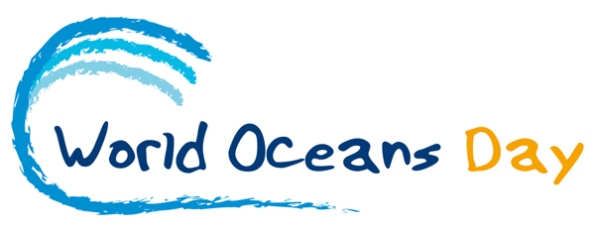
The following is a guest post from WorldOceansDay.org. This is an important event and deserves our attention so I am reposting it on Earthgauge.
World Oceans Day, the UN-designated day for the global community to celebrate and take action for our shared ocean. This year, take a moment to make change on two little-known but all-important issues: global warming and ocean acidification.
Carbon emissions from human activity are changing the Earth’s climate, leading to rising sea levels, and contributing to more frequent and intense extreme weather events that directly threaten every one of us–no matter whether we live along the coast or far inland. Recent public surveys show that ocean acidification is not yet well known but it’s an issue that will become much more prominent, and, fortunately, you can help make a real difference!
Green Power
Use cleaner and healthier alternatives to fossil fuels and advocate for more! Buying green energy for your home is one of the best ways to reduce your carbon emissions. You can find some resources on Global Energy Network Institute. If you live in the US, check the EPA’s Green Power Partnership.
Commute wisely
Get out your bike or buy a used one, take public transportation more regularly, try car sharing, seek carpooling partners, or consider telecommuting on the phone or video service such as Skype. Every time you skip the car for one of these alternatives, you help our ocean!
Buy less stuff
Think before you buy and ask whether you really need something, or if you can get it used. Not only will you be helping the ocean but also the fun new hobby of thrifting is a great form of self expression, especially when it comes to things like clothing or home goods, where a vintage item can have more personality and quality than buying new at a store. If you’re in the US, you can click here to find a thrift store near you!
Encourage local government leadership!
Get your mayor to commit to helping by signing on to a coalition for the protection of the climate (e.g. Cities for Climate Protection Campaign or Mayors for Climate Protection). Many national governments are failing to take adequate action in a timely fashion, so we can each help at the local level to make the push for a safer, healthier blue planet. Plus, the more we do on the local front, the easier it becomes for national and global action with real “teeth” to make a difference in our lifetimes!
Vote with your dollars
Support socially responsible companies, and do your research to make sure it’s not just green washing or mere lip service to environmental protection. You can use websites like EthicalConsumer.org to check out companies and products. Check a corporation’s reputation against multiple websites and make the best choice!
There are hundreds of events being held all over the world, find one near you and celebrate with a purpose this World Oceans Day! You can also go the extra mile and organize an event yourself using ideas and free materials provided at WorldOceansDay.org!
“Dark Age” for Canadian Science
In yet another example of the Canadian government’s antipathy toward science and hatred of all things environmental, check out this article from the excellent journalist Andrew Nikiforuk. Here’s an excerpt:
Just as citizens flocked to their cottages and launched their boats, the government of Stephen Harper pulled the plug on Canada’s greatest freshwater defender and scientific achievement: the Experimental Lakes Area.
The killing of the program is the latest in a series of coordinated attacks on environmental science and the gutting of most of the nation’s environmental legislation. It not only trashes Canada’s international reputation but confirms the Harper government’s pathological hatred for science of any kind.
Just what are Harper and his cronies planning to kill next?
The Tyee – The Gem of Canadian Science that Harper Killed.
Water conflicts rising around the world

Lack of water is predicted to cause significant problems in coming years.
On Earthgauge Radio yesterday, we discussed some of the looming problems of global water scarcity in an age of rising demand and climate change. Appropriately, this story only confirms that we are in for a rocky road in the coming decades if action is not taken to address some of our serious water challenges.
A new report by the U.S. office of the Director of National Intelligence said that areas including South Asia, the Middle East and North Africa will face major challenges in coping with water problems that could hinder the ability to produce food and generate energy.
The language employed in the report does not equivocate. This is not the report of an environmental organization. This is an Intelligence Community Assessment (ICA) prepared by the U.S. Director of National Intelligence on a request made by Secretary of State Hillary Rodham Clinton to assess the impact of global water issues on U.S. national security interests over the next 30 years. Their findings? Fresh water supplies are unlikely to keep up with global demand by 2040, increasing political instability, hobbling economic growth and endangering world food markets.
Here are a couple excerpts from the report. Read the news release here.
During the next 10 years, many regions will experience water challenges – shortages, poor water quality, or floods – that will increase the risk of instability and state failure, increase regional tensions, and distract them from working with the United States on important U.S. policy objectives. Between now and 2040, fresh water availability will not keep up with demand absent more effective management of water resources. Water problems will hinder the ability of key countries to produce food and generate energy, posing a risk to global food markets and hobbling economic growth. As a result of demographic and economic development pressures, North Africa, the Middle East, and South Asia will face major challenges coping with water problems.
While wars over water are unlikely within the next 10 years, water challenges – shortages, poor water quality, floods – will likely increase the risk of instability and state failure, exacerbate regional tensions, and distract countries from working with the United States on important policy objectives, according to an assessment prepared by the U.S. Intelligence Community (IC).
For more info, check out this article in the U.S. Insurance Journal.